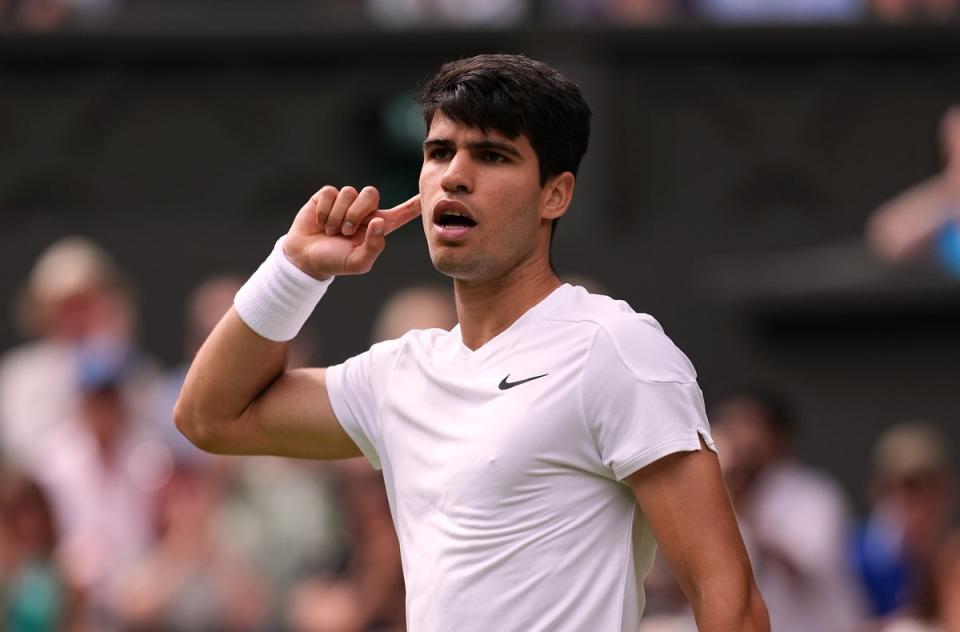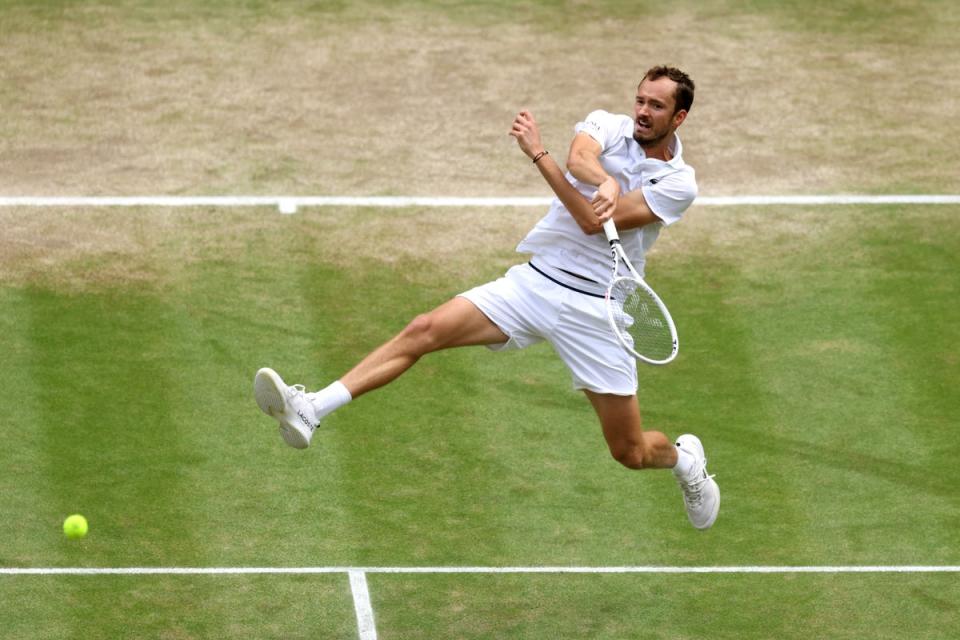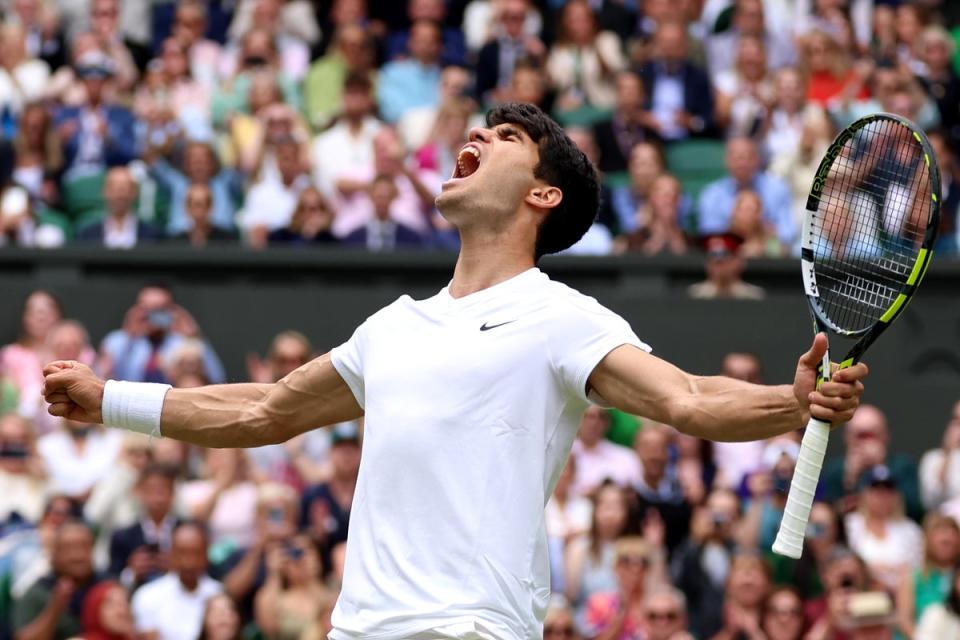The Carlos Alcaraz experience – and why it is so effective as Spaniard reaches second Wimbledon final

The common courtesy of an apology to the opponent in a moment of fortune is fairly unique to tennis. You rarely see a hand up in one’s regrets for a fortuitously shinned shot into the goal; nor for a shanked golf drive rebounding off the trees and onto the fairway. Perhaps it’s the sport’s genuine adversarial nature which affords this refreshing sign of affability in the heat of battle. Do they mean it? Who knows – but the simple hand signal is enough.
Intriguingly, it is also an unorthodox indicator of what it means to watch, and face, Carlos Alcaraz. A player so unpredictable in his shot selection and rhythm that, in the 57-minute first set of his Wimbledon semi-final against Daniil Medvedev, he raised his hand in apology five times. A few net cords here, a few framed groundstrokes there, in a set he eventually lost. Yet the intoxicating Spaniard’s greatest weakness is also his greatest strength.
It’s fair to say the more appropriate summation is: why stick to routine when you have every shot in the manual available at your disposal? Alcaraz’s capriciousness – a drop-shot, a serve-and-volley, a devilish top-spin lob, and the rest – is why he has won a Grand Slam on every surface at the age of 21. It is why he is one win away from completing the notoriously difficult double-act of winning at Roland Garros and Wimbledon in the same year. And it is why, again, he had too much for the streaky figure of Medvedev to seal a second straight final at the All England Club via a 6-7(1), 6-3, 6-4, 6-4 scoreline.
That final on Sunday will likely be against the same opponent as last year, too. Novak Djokovic is hot favourite to beat Lorenzo Musetti in Friday’s second semi-final and if Sunday’s showpiece is anything like last year’s five-set thriller, those watching are in for another treat. Why act like a lunatic in Leicester Square before the Euros final when you can watch this man on the tennis court instead?
Because that’s what the Carlos Alcaraz experience is: spellbinding lunacy.
“I was trying to do different things,” he said, about trying to break down 6ft 6in Medvedev. “No long rallies, hit some drop shots, go to the net as much as I can. Just trying to play my own game. It was difficult to break the wall!”
This was the third contest in four years at Wimbledon between these two and, 12 months ago at the same stage, Alcaraz wiped the floor with Medvedev in straight-sets. This time, it was clear from the outset that it would not be so one-sided. After saving a break point in the first game, it was Medvedev who struck first before he cheaply failed to consolidate. Yet another break was dished up by the Spaniard: there’s use of the drop-shot, and then there’s Alcaraz using it on four out of five points. Only one came off – and Medvedev was a game away from the set.
Yet it is the randomness of Alcaraz – a world where nothing is certain, no drilled cross-court routine too embedded to stick to – which makes him such an incomparable draw for the masses. One minute he is miscuing and misfiring; the next he is electric, producing ridiculous angles and power from all areas of the court. No shot is too outlandish to attempt.


You know by now where this is going: Alcaraz broke back, sealed with one final drop-shot which Medvedev, by the ruling of Greek chair umpire Eva Asderaki, did not reach before the ball bounced twice. Medvedev muttered something expletive her way, the supervisor was concerningly called and the Russian received a warning. It could well have been more severe.
In spite of that, it was riveting stuff, which would conclude with the inevitable tie-break; a tie-break that, given Alcaraz’s erratic opening hour, felt like one Medvedev had to clinch. And so came a near-faultless eight points, with the Russian not giving an inch with winners off return and rapid chase-downs across the court, to claim it 7-1.
For Alcaraz, no matter. The defending champion had dropped sets in his last three matches and his remarkable powers of recovery are one of his greatest strengths, especially in the latter stages of Grand Slams. If the first set was his warm-up act, the second set was the main event, as he broke serve at 2-1 with a trademark whipped forehand pass on the run.


At this stage, Medvedev was largely powerless; a simple character in the protagonist’s starring role. Despite a wobble on his first set-point via a double-fault, Alcaraz took the second-set and directed a fist-pump towards his player box, which included Real Madrid star Luka Modric.
Alcaraz took the lead in the match for the first time as he broke in the third game of the third set and, now, he was cooking. There was one moment where he tried a ridiculously disguised overhead volley – the smash-drop if you will – which bounced before the net. He comically put his head in his hands. But for all the variety in the world, Alcaraz had upped his first-serve accuracy from 46% in set one to 64% in set three. Sometimes, it’s the basics which can do the business better than anything else.
Medvedev had no answer. Frankly who does when Alcaraz is in the midst of one of his glorious hot streaks. Though the Russian, who stopped world No 1 Jannik Sinner in his tracks in the quarter-finals, retrieved an early break he couldn’t retrieve the continuous tone of this match At 3-3, Alcaraz sealed the match-winning break with a brutal backhand that Medvedev could only return long. The fifth seed, a major winner himself, turned to his box and shrugged. As if to say: “What can I do?”
But that’s why Alcaraz is so effective. How can you plan for a chain of attack you can’t see coming? Alcaraz sealed it with one final forehand approach shot and screamed to the heavens in celebration. On an afternoon of unpredictability, the pre-match prediction was one which the experts did see coming: Alcaraz in four.

